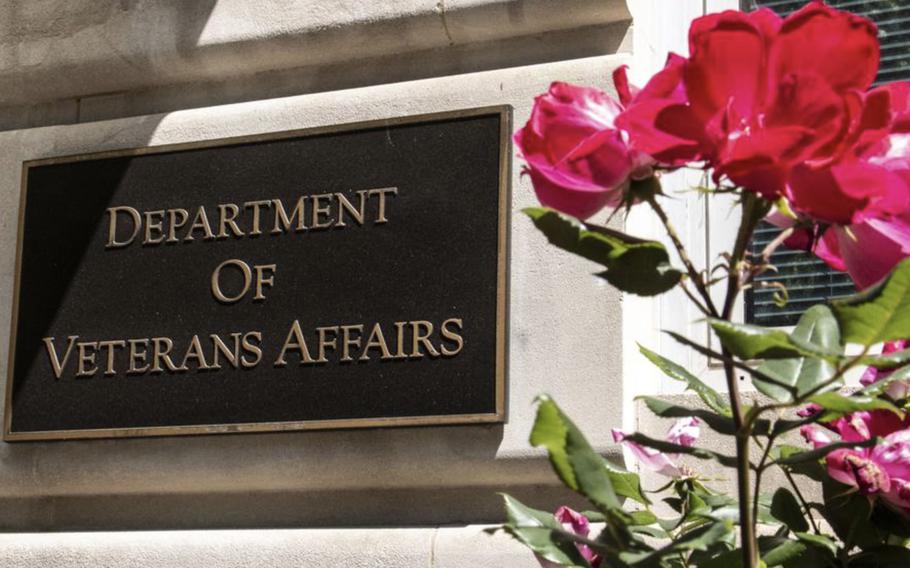
Lawmakers are urging the Department of Veterans Affairs to take more steps to reduce a backlog of claims from disabled veterans and their survivors seeking health care services and benefits. (Stars and Stripes)
WASHINGTON — Lawmakers urged the Department of Veterans Affairs to take more steps to reduce a backlog of claims from disabled veterans and their survivors seeking health care services and benefits, which peaked at more than 400,000 in January.
VA managers and union leaders testified this week at a hearing of the House Veterans’ Affairs Committee subpanel on disability assistance and memorial affairs about their response to the recent surge in requests for compensation driven by passage of the Sergeant First Class Heath Robinson Honoring our Promise to Address Comprehensive Toxics Act, or PACT Act.
In the two years since the PACT Act became law, the VA has received an average of 195,800 claims per month, an increase of 57,000 claims from the prior two years, according to the VA.
The PACT Act, adopted in 2022, awards benefits to veterans exposed to toxins during military service, including from burn pits, Agent Orange, asbestos and other hazardous materials.
Willie Clark, deputy undersecretary for field operations at the Veterans Benefits Administration, said the backlog has dropped from 423,179 claims pending for more than 125 days in January to 300,000 claims as of May.
Clark emphasized the VA has made gains by centralizing claims in areas that include toxic exposures and military sexual trauma. The centralization enables workers who have developed specialized training and knowledge to focus on these areas.
He said a Minnesota veteran in his 70s recently filed a claim for cancer that was sent to the Houston office and the Milwaukee regional office. Clark said five days later the VA determined the veteran had a terminal illness that needed immediate decision and resulted in him being awarded 100% in disability compensation, up from 10%.
But lawmakers said more work needs to be done to reduce the wait times for receiving benefits.
Clark pointed to the unprecedented increase in claims that has added to everyone’s workload.
“As new employees are onboarded and complete the training, the Veterans Benefits Administration is further poised to reduce inventory and improve delivery,” he said.
Ashlynne Haycock-Lohmann, a deputy director at the Tragedy Assistance Program for Survivors, a nonprofit organization for family members grieving the loss of a service member or veteran, said there are chronic delays in indemnity compensation for dependents of deceased service members and veterans.
“This is the point where most survivors give up because they feel it is not worth continuing to try to obtain their benefits,” she said.
Kenneth Smith, assistant deputy undersecretary for operations management in the VA Office of Field Operations, said about 600 forms have been sent to parents and guardians of the children to clarify the steps needed to ensure families receive compensation. He said in the past minors signed the forms when an adult’s signature also was needed.
Smith also said when mistakes are made by processors — called “avoidable deferrals” — claims might be sent to another regional office for correction.
Rep. Chris Pappas, D-N.H., said he is hearing from veterans and survivors that backlogged claims seem to get “stuck” in the automated routing system of the national work queue, causing lengthy delays.
The claim is bounced among several offices for review but fails to yield a decision in a timely manner, and processors rarely receive feedback about their work, he said.
“Unnecessary deferrals produce large-scale inefficiencies,” Pappas said.
Clark said the national automated work queue distributes claims for processing using an algorithm based on capacity at regional offices to handle them.
Each night, the queue sorts claims based on age and priority while also balancing the national workload across all regional offices, he said.
The work queue also assigns claims to specialty offices that works on more complex cases for health care coverage. The VA has focused on hiring and training processors to handle these cases, Clark said.
Rep. Morgan Luttrell, R-Texas, who is chairman of the subcommittee, said there needs to be greater attention to reducing delays, especially in processing claims for military sexual trauma and survivor benefits.
“Veterans and survivors with special types of claims experience longer times for decisions,” he said.
Rep. John McGarvey, D-Ky., asked for ideas to smooth the process and ease holdups in decisions.
James Swartz, president of the American Federation of Government Employees, Local 2823, said the current approach of moving claims to different regional offices at different stages of the approval process is creating confusion among processors.
AFGE Local 2823 is the union representing the Cleveland office of the Veterans Benefits Administration.
“Every regional office often has its own way of conducting specific tasks,” Swartz said.
He said “small, but critical differences” in how claims are handled contribute to unnecessary delays in awarding benefits.
McGarvey said one of his constituents who filed a claim for military sexual trauma has been waiting for more than a year for a decision.
Upon contacting the VA on behalf of the veteran, he said his office learned the claim would be reprocessed when the office had the staffing and capacity to get it done.
“These issues have a devastating impact on veterans and their families. The claims that require special handling are getting caught in a system that is not equipped to manage the complex reviews,” McGarvey said.